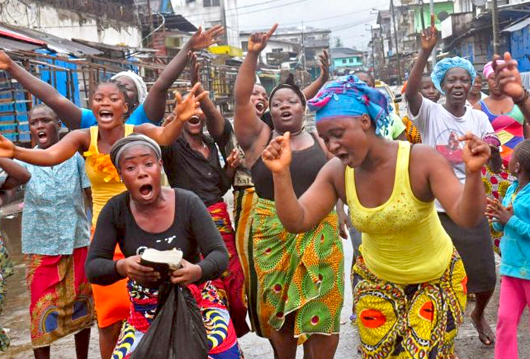
Monrovia/Conakry, Sep 1: Crowds sang and danced in the streets of a seaside neighborhood in Liberia on Saturday as the government lifted quarantine measures designed to contain the spread of the deadly Ebola virus.
Faced with the worst Ebola outbreak in history, West African governments have struggled to find an effective response. More than 1,550 people have died from the hemorrhagic fever since it was first detected in the forests of Guinea in March.
Residents of the impoverished seaside district of West Point in Monrovia were forcibly cut off from the rest of the capital in mid-August after a crowd attacked an Ebola center there, allowing the sick to flee.
The quarantine sparked protests and security forces responded with tear gas and bullets, killing a teenaged boy.
But at dawn on Saturday, the community woke up to find the soldiers and barricades gone.
"I tell God thank you. I tell everyone thank you," said Koffa, a female resident of West Point. Others danced in the streets chanting slogans like "we are free" while others rolled about on the asphalt pavement in celebration.
President Ellen Johnson-Sirleaf, a U.S.-educated Nobel Peace Prize winner, has sought to quell criticism of the government's response by issuing orders threatening officials with dismissal for failing to report for work or for fleeing the country, and has ordered an investigation into the West Point shooting.
Liberia, where infection rates are highest, plans to build five new Ebola treatment centers each with capacity for 100 beds, government and health officials said on Saturday.
In neighboring Sierra Leone, President Ernest Bai Koromo dismissed his health minister Miatta Kargbo on Friday over her handling of the epidemic which has killed more than 400 people there.
Her replacement Abubakarr Fofana on Saturday confirmed that a third doctor in the county had died from Ebola, further hampering its ability to respond to the outbreak.
"It is with a deep sense of sadness that we have lost one of our finest physicians in the line of duty at a time like when we need a lot of them to help in out fight against Ebola," he said.
Physician Dr. Sahr Rogers caught the disease while treating outpatients in the same hospital where a doctor died last month and where British nurse William Pooley was also infected.
SPREAD TO SENEGAL
Transmitted through the vomit, blood and sweat of the sick, Ebola has also spread to Nigeria and Senegal, which reported its first confirmed case on Friday - a Guinean student who was lost to authorities in his own country while under surveillance.
"His brother came from Sierra Leone where he was infected and has died. Shortly afterwards, this student left for Senegal," said Dr. Rafi Diallo, spokesman for the Guinean health ministry.
Two other members of his family - his sister and mother - have died from Ebola, Guinean health ministry sources said.
A resident in the suburb of the Senegalese capital Dakar where the student resided said on Saturday that a team of health ministry officials wearing white protective suits and masks came to spray disinfectant at his home and a local grocer's shop.
Many Dakar residents worry that the student could have spread the highly contagious virus in the three weeks since he was last reported in Guinea.
In Nigeria, where an infected traveler collapsed after arriving the Lagos airport, there have so far been 19 suspected, probable and confirmed cases and seven deaths.
"To avoid a situation like Nigeria, they need to be able to follow hundreds of contacts," said epidemiologist Jorge Castilla of the European Commission's Humanitarian Aid and Civil Protection Department in Dakar. "Whatever they do, there will probably be a second set of sick people as this guy has been here for some time."
Senegal has since closed its land border with Guinea and halted flights to Guinea, Sierra Leone and Liberia, defying advice from the World Health Organization (WHO) that there is no need for travel restrictions.
A note from the WHO and the International Civil Aviation Organization sent to health ministries on Aug. 29 said: "Lives are being unnecessarily lost because health care workers cannot travel to the affected countries, and delivery of life saving equipment and supplies is being delayed."
The World Food Programme said it needs to raise $70 million to feed 1.3 million people at risk from shortages in the Ebola-quarantined areas in West Africa, with the agency's resources already stretched by several major humanitarian crises.






Comments
Add new comment